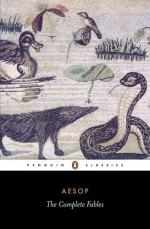|
This section contains 1,245 words (approx. 5 pages at 300 words per page) |

|
SOURCE: J. H. Driberg, "Aesop," in The Spectator, Vol. 148, No. 5425, June 18, 1932, pp. 857-58.
In the following essay, Driberg discusses the possible influence of African folktales on Aesop's fables.
Little is known of Aesop till after he had won his freedom. Some say that he was a Phrygian slave—but that, perhaps, is because his master was Iadmon of Samos, who doubtless visited Phrygia from time to time. The more general view, however, is that he was an African, who, taken in slavery, drifted to Asia Minor and the Islands. His very name, Aesop, perverted from Acthiop, indicates his African origin. He visited the court of Croesus as a freed-man, and later met his death at Delphi, possibly (again accounts vary) for peculating trust funds—how could modern financiers survive such drastic treatment?—but more probably because, as was the way of Archilochus, his tongue was barbed with a...
|
This section contains 1,245 words (approx. 5 pages at 300 words per page) |

|


